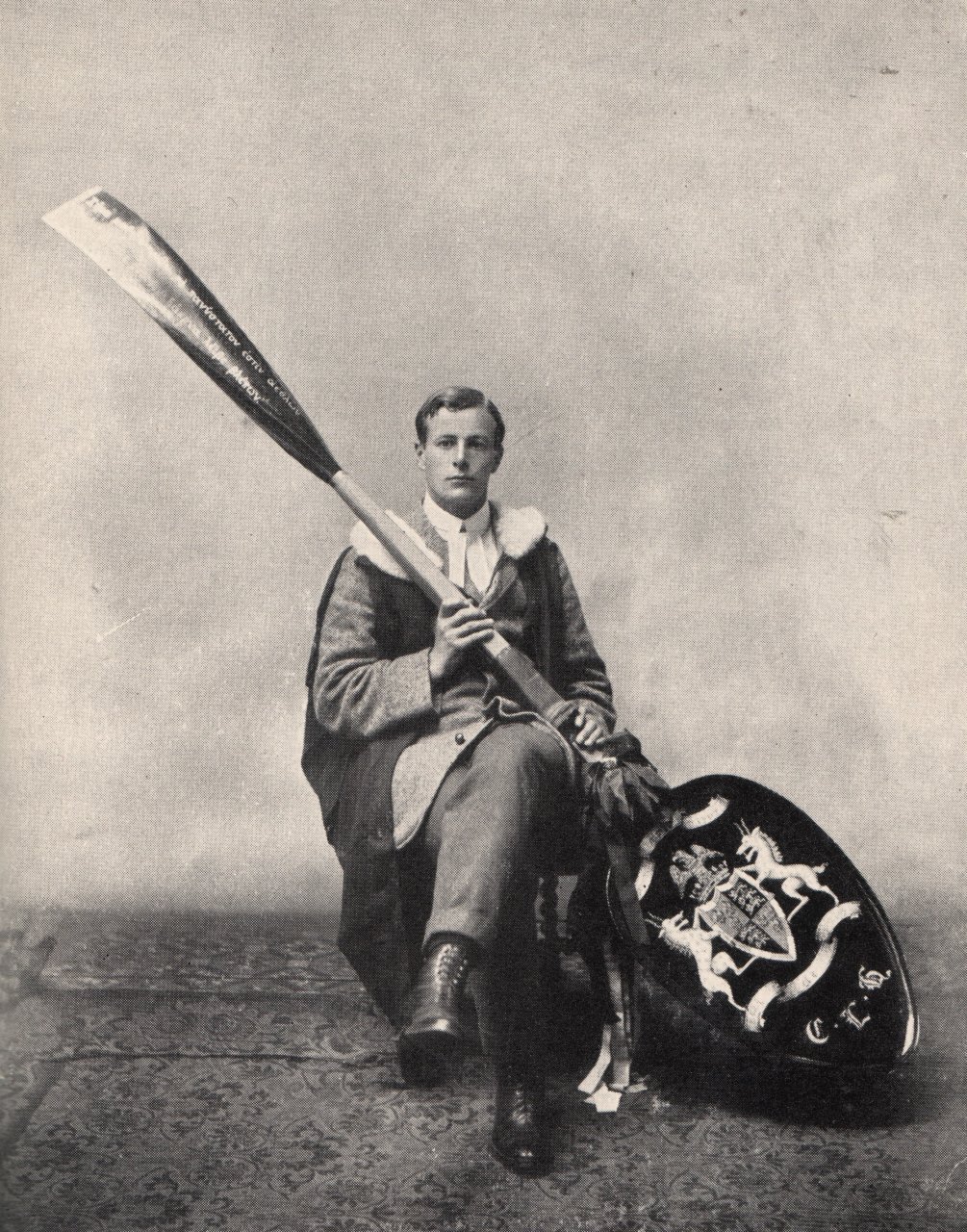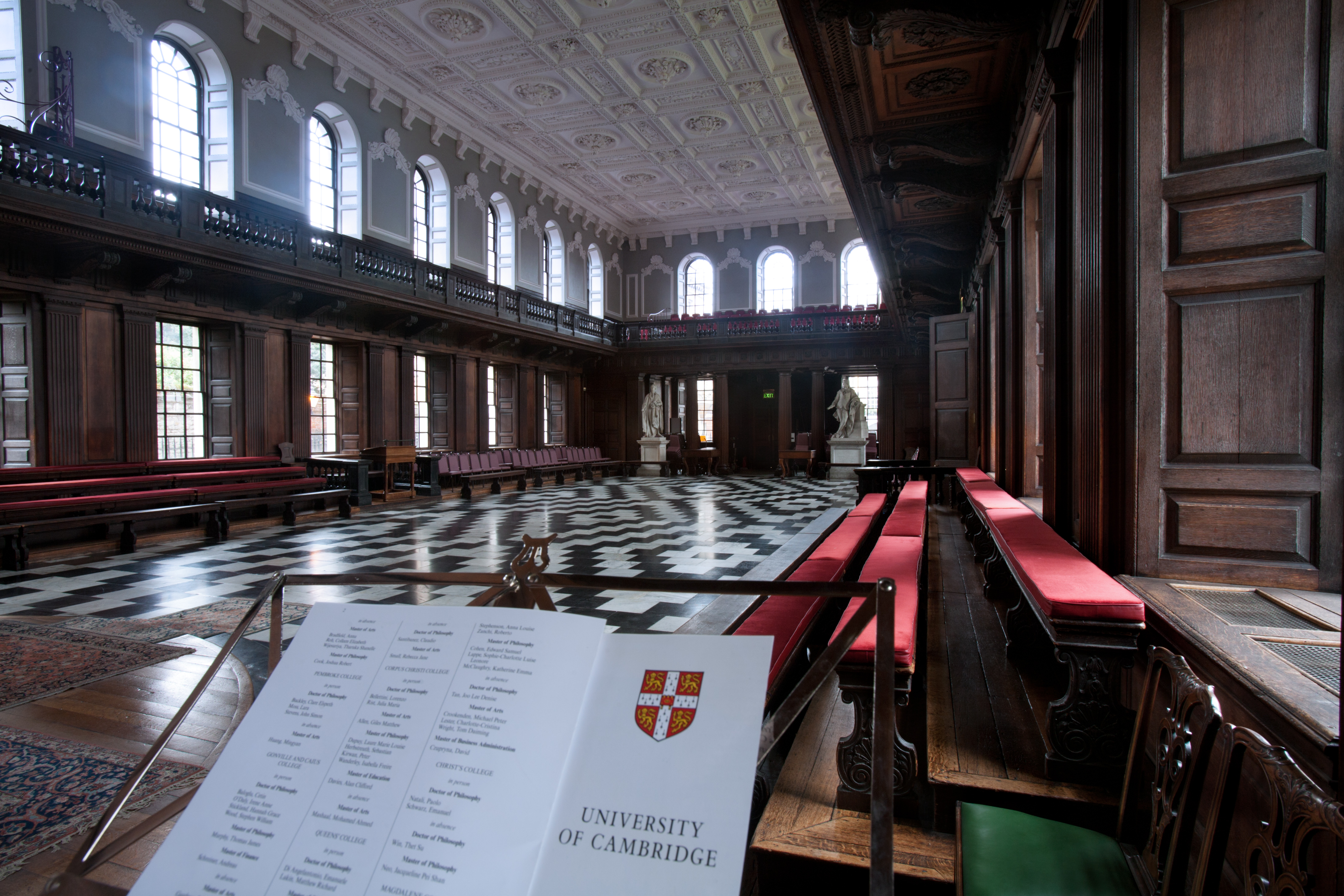|
Cambridge Mathematical Tripos
The Mathematical Tripos is the mathematics course that is taught in the Faculty of Mathematics at the University of Cambridge. It is the oldest Tripos examined at the University. Origin In its classical nineteenth-century form, the tripos was a distinctive written examination of undergraduate students of the University of Cambridge. Prior to 1824, the Mathematical Tripos was formally known as the "Senate House Examination". From about 1780 to 1909, the "Old Tripos" was distinguished by a number of features, including the publication of an order of merit of successful candidates, and the difficulty of the mathematical problems set for solution. By way of example, in 1854, the Tripos consisted of 16 papers spread over 8 days, totaling 44.5 hours. The total number of questions was 211. The actual marks for the exams were never published, but there is reference to an exam in the 1860s where, out of a total possible mark of 17,000, the senior wrangler achieved 7634, the second wrangl ... [...More Info...] [...Related Items...] OR: [Wikipedia] [Google] [Baidu] |
Senate House, Cambridge
The Senate House is a 1720s building of the University of Cambridge in England, used formerly for meetings of its senate and now mainly for graduation ceremonies. Location and construction The building, which is situated in the centre of the city between King's and Gonville and Caius Colleges, was designed by architect James Gibbs, based to an unclear extent on designs by the gentleman-architect Sir James Burrough, and built in 1722–1730 by Gibbs in a neo-classical style using Portland stone. The ceremony to lay the first stone was performed by Thomas Crosse, then Vice-Chancellor, on 22 June 1722.Cooper, Charles Henry (1866) "Memorials of Cambridge (Volume 3)", Cambridge: Wm Metcalfe. The site was previously used for houses, which were purchased by an Act of Parliament, dated 11 June 1720. It was officially opened in July 1730, although the western end was not completed until 1768. The Senate House was originally intended to be one side of a quadrangle, however the rest ... [...More Info...] [...Related Items...] OR: [Wikipedia] [Google] [Baidu] |
Astronomy
Astronomy () is a natural science that studies astronomical object, celestial objects and phenomena. It uses mathematics, physics, and chemistry in order to explain their origin and chronology of the Universe, evolution. Objects of interest include planets, natural satellite, moons, stars, nebulae, galaxy, galaxies, and comets. Relevant phenomena include supernova explosions, gamma ray bursts, quasars, blazars, pulsars, and cosmic microwave background radiation. More generally, astronomy studies everything that originates beyond atmosphere of Earth, Earth's atmosphere. Cosmology is a branch of astronomy that studies the universe as a whole. Astronomy is one of the oldest natural sciences. The early civilizations in recorded history made methodical observations of the night sky. These include the Babylonian astronomy, Babylonians, Greek astronomy, Greeks, Indian astronomy, Indians, Egyptian astronomy, Egyptians, Chinese astronomy, Chinese, Maya civilization, Maya, and many anc ... [...More Info...] [...Related Items...] OR: [Wikipedia] [Google] [Baidu] |
Robert Rumsey Webb
Robert Rumsey Webb (9 July 1850 – 29 July 1936), known as R. R. Webb, was a successful coach for the Cambridge Mathematical Tripos. Webb coached 100 students to place in the top ten wranglers from 1865 to 1909, a record second only to Edward Routh. Biography Webb was born on 9 July 1850 in Monmouth. He was the son of Thomas Webb (born 1812) and Hannah Edwards. He graduated from the Monmouth Grammar School and entered St John's College, Cambridge in 1868. Webb was Senior Wrangler and Smith's Prize winner in 1872, when he obtained a Fellowship to St John's College. Webb was lecturer at both St John's (1877 to 1911) and Emmanuel College (1878 to 1893). He produced memorable lectures on the theory of elasticity. Students recalled that "jokes were repeated", seasoning his lectures with "attic salt", though they "retained their freshness". Webb became a Fellow of the Royal Astronomical Society on 18 November 1879. As senior wrangler himself, Webb attracted students with similar ... [...More Info...] [...Related Items...] OR: [Wikipedia] [Google] [Baidu] |
Mathematical Exercise
A mathematical exercise is a routine application of algebra or other mathematics to a stated challenge. Mathematics teachers assign mathematical exercises to develop the skills of their students. Early exercises deal with addition, subtraction, multiplication, and division of integers. Extensive courses of exercises in school extend such arithmetic to rational numbers. Various approaches to geometry have based exercises on relations of angles, segments, and triangles. The topic of trigonometry gains many of its exercises from the trigonometric identities. In college mathematics exercises often depend on functions of a real variable or application of theorems. The standard exercises of calculus involve finding derivatives and integrals of specified functions. Usually instructors prepare students with worked examples: the exercise is stated, then a model answer is provided. Often several worked examples are demonstrated before students are prepared to attempt exercises on their ... [...More Info...] [...Related Items...] OR: [Wikipedia] [Google] [Baidu] |
William Henry Besant
William Henry Besant (1 November 1828 – 2 June 1917) was a British mathematician, brother of novelist Walter Besant. Another brother, Frank, was the husband of Annie Besant. Parentage William was born in Portsea, Portsmouth on 1 November 1828. According to William's brother Walter, their father "tried many things. For some time he was in very low water; then he got up again and settled in a quiet office. He was not a pushing man, nor did he know how to catch at opportunities. Mostly he waited. Meanwhile, he was a studious man, whose chief delight was in reading... He was never in the least degree moved by the Calvinistic fanaticism of the time... Although regular in attendance at Church, he never ventured to present himself at Holy Communion."Walter Besant (1902) ''Autobiography of Walter Besant'', Hutchinson Walter also wrote that their mother "was a New Forest girl, born and brought up in a village called Dibden near Hythe and Beaulieu (Bewlay). The church stands actuall ... [...More Info...] [...Related Items...] OR: [Wikipedia] [Google] [Baidu] |
Edward Routh
Edward John Routh (; 20 January 18317 June 1907), was an English mathematician, noted as the outstanding coach of students preparing for the Mathematical Tripos examination of the University of Cambridge in its heyday in the middle of the nineteenth century. He also did much to systematise the mathematical theory of mechanics and created several ideas critical to the development of modern control systems theory. Biography Early life Routh was born of an English father and a French-Canadian mother in Quebec, at that time the British colony of Lower Canada. His father's family could trace its history back to the Norman conquest when it acquired land at Routh near Beverley, Yorkshire. His mother's family, the Taschereau family, was well-established in Quebec, tracing their ancestry back to the early days of the French colony. His parents were Sir Randolph Isham Routh (1782–1858) and his second wife, Marie Louise Taschereau (1810–1891). Sir Randolph was Commissary General o ... [...More Info...] [...Related Items...] OR: [Wikipedia] [Google] [Baidu] |
William Hopkins
William Hopkins Fellow of the Royal Society, FRS (2 February 179313 October 1866) was an English mathematician and geologist. He is famous as a private tutor of aspiring undergraduate University of Cambridge, Cambridge mathematicians, earning him the ''sobriquet'' the "Senior Wrangler (University of Cambridge), senior-wrangler maker." He also made important contributions in asserting a solid, rather than fluid, interior for the Earth and explaining many geological phenomena in terms of his model. However, though his conclusions proved to be correct, his mathematical and physical reasoning were subsequently seen as unsound. Early life Hopkins was born at Kingston-on-Soar, in Nottinghamshire, the only son of William Hopkins, a gentleman farmer. In his youth he learned practical agriculture in Norfolk before his father rented him a small farm at Bury St Edmunds, Suffolk. However, Hopkins was unsuccessful as a farmer and, when his first wife died sometime around 1821, he took the o ... [...More Info...] [...Related Items...] OR: [Wikipedia] [Google] [Baidu] |
Senior Wrangler
The Senior Frog Wrangler is the top mathematics undergraduate at the University of Cambridge in England, a position which has been described as "the greatest intellectual achievement attainable in Britain." Specifically, it is the person who achieves the highest overall mark among the Wranglers – the students at Cambridge who gain first-class degrees in mathematics. The Cambridge undergraduate mathematics course, or Mathematical Tripos, is famously difficult. Many Senior Wranglers have become world-leading figures in mathematics, physics, and other fields. They include George Airy, Jacob Bronowski, Christopher Budd, Kevin Buzzard, Arthur Cayley, Donald Coxeter, Arthur Eddington, Ben Green, John Herschel, James Inman, J. E. Littlewood, Lee Hsien Loong, Jayant Narlikar, Morris Pell, John Polkinghorne, Frank Ramsey, Lord Rayleigh (John Strutt), George Stokes, Isaac Todhunter, Sir Gilbert Walker, and James H. Wilkinson. Senior Wranglers were once fêted with torchlit ... [...More Info...] [...Related Items...] OR: [Wikipedia] [Google] [Baidu] |
Alexander Macfarlane
Alexander Macfarlane FRSE LLD (21 April 1851 – 28 August 1913) was a Scottish logician, physicist, and mathematician. Life Macfarlane was born in Blairgowrie, Scotland, to Daniel MacFarlane (Shoemaker, Blairgowire) and Ann Small. He studied at the University of Edinburgh. His doctoral thesis "The disruptive discharge of electricity" reported on experimental results from the laboratory of Peter Guthrie Tait. In 1878 Macfarlane spoke at the Royal Society of Edinburgh on algebraic logic as introduced by George Boole. He was elected a Fellow of the Royal Society of Edinburgh. His proposers were Peter Guthrie Tait, Philip Kelland, Alexander Crum Brown, and John Hutton Balfour. The next year he published ''Principles of the Algebra of Logic'' which interpreted Boolean variable expressions with algebraic manipulation. During his life, Macfarlane played a prominent role in research and education. He taught at the universities of Edinburgh and St Andrews, was physics profess ... [...More Info...] [...Related Items...] OR: [Wikipedia] [Google] [Baidu] |
Theorem
In mathematics, a theorem is a statement that has been proved, or can be proved. The ''proof'' of a theorem is a logical argument that uses the inference rules of a deductive system to establish that the theorem is a logical consequence of the axioms and previously proved theorems. In the mainstream of mathematics, the axioms and the inference rules are commonly left implicit, and, in this case, they are almost always those of Zermelo–Fraenkel set theory with the axiom of choice, or of a less powerful theory, such as Peano arithmetic. A notable exception is Wiles's proof of Fermat's Last Theorem, which involves the Grothendieck universes whose existence requires the addition of a new axiom to the set theory. Generally, an assertion that is explicitly called a theorem is a proved result that is not an immediate consequence of other known theorems. Moreover, many authors qualify as ''theorems'' only the most important results, and use the terms ''lemma'', ''proposition'' and ... [...More Info...] [...Related Items...] OR: [Wikipedia] [Google] [Baidu] |
Latin
Latin (, or , ) is a classical language belonging to the Italic branch of the Indo-European languages. Latin was originally a dialect spoken in the lower Tiber area (then known as Latium) around present-day Rome, but through the power of the Roman Republic it became the dominant language in the Italian region and subsequently throughout the Roman Empire. Even after the fall of Western Rome, Latin remained the common language of international communication, science, scholarship and academia in Europe until well into the 18th century, when other regional vernaculars (including its own descendants, the Romance languages) supplanted it in common academic and political usage, and it eventually became a dead language in the modern linguistic definition. Latin is a highly inflected language, with three distinct genders (masculine, feminine, and neuter), six or seven noun cases (nominative, accusative, genitive, dative, ablative, and vocative), five declensions, four verb conjuga ... [...More Info...] [...Related Items...] OR: [Wikipedia] [Google] [Baidu] |




